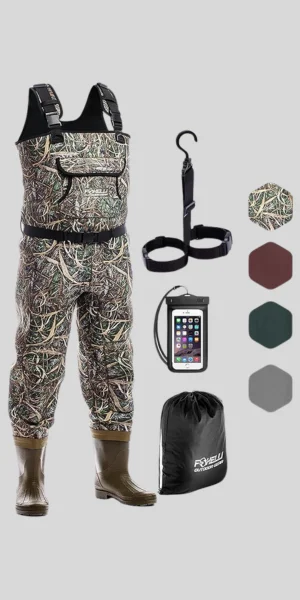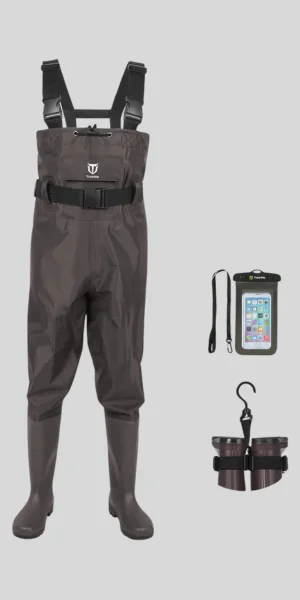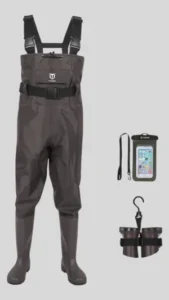When it comes to selecting the perfect pair of waders for your outdoor adventures, there is a plethora of options available. However, two materials that often stand out in the market are neoprene and PVC.
While both have their own unique qualities, it can be overwhelming to determine which one is best suited for your needs. In this article, we will provide an informative and in-depth comparison of neoprene vs. PVC waders, covering various aspects such as material, durability, water resistance, insulation, breathability, weight, comfort, and price.
By the end of this article, you will have a better understanding of these two materials and be able to make an informed decision when purchasing your next pair of waders.
Comparison Table: Neoprene or PVC Waders:
What Are Neoprene Waders?
Neoprene waders are made from a synthetic rubber material known for its durability and water resistance. The material also boasts excellent insulation properties, making it a suitable choice for cold-water fishing or hunting.
Neoprene waders are highly durable and can last for many years with proper care, making them a worthy investment. Neoprene waders offer a significant advantage by effectively maintaining warmth and dryness even in frigid waters.
The material provides excellent water resistance, preventing any leaks or seepage. This is especially important when spending long hours in the water, as it can protect you from the elements and keep you comfortable.
Neoprene waders also provide good breathability, allowing for some airflow to prevent overheating. This is important for staying comfortable and avoiding sweat buildup, which can lead to discomfort and even certain health issues.
Neoprene waders are relatively lightweight and offer flexibility, allowing for ease of movement while fishing or hunting.

Advantage And Disadvantage Of Neoprene Waders:
Advantages:
- Highly durable and resistant to wear and tear
- Excellent water resistance, keeps you dry in cold water
- Great insulation properties for warmth in cold temperatures
- Moderately breathable for comfort while fishing or hunting
- Relatively lightweight for ease of movement
Disadvantages:
- More expensive than PVC waders
- May feel bulky and restrict movement for some individuals
- Can take time to break in for a comfortable fit
What Are PVC Waders?
PVC waders are made from polyvinyl chloride, a type of plastic material. They are typically more affordable than neoprene waders, making them a popular choice among budget-conscious anglers or hunters. However, this lower price point comes with some trade-offs.
PVC waders are not as durable as neoprene waders and are more prone to punctures and tears. This can be a concern for those who spend a lot of time in rough or rocky waters. PVC material is not as effective at insulating, making it less suitable for extremely cold conditions.
PVC waders offer decent water resistance; however, neoprene waders are more effective. They also lack the breathability and flexibility of neoprene waders, which can lead to discomfort for some individuals.
PVC waders may feel stiff and uncomfortable at first, but with time, they can become more comfortable as they mold to your body shape.

Advantage And Disadvantage Of PVC Waders:
Advantages:
- More affordable compared to neoprene waders
- Good water resistance for staying dry
- Budget-friendly option for those on a tight budget
Disadvantages:
- Not as durable as neoprene, prone to punctures and tears
- Lacks insulation properties, not suitable for extremely cold conditions
- Less breathable and less flexible than neoprene waders
Neoprene vs. PVC Waders: Which is Better?
When it comes to choosing between neoprene and PVC waders, there is no clear winner. It ultimately depends on your personal preferences and the conditions in which you will be using the waders.
Waterproofing
Both neoprene and PVC waders are waterproof, but neoprene is known for its superior waterproofing abilities. Neoprene waders are made from a thicker material, making them less likely to tear or puncture and allowing for better protection against water.
Insulation
If you will be using your waders in cold weather, neoprene waders are the better choice. The thicker material provides better insulation and will keep you warmer in colder temperatures. PVC waders are better suited for warm weather, as they are not as insulating and may be too warm for use in hot weather.
Comfort and Flexibility
Neoprene waders are known for their flexibility, allowing for a comfortable and unrestricted range of motion. PVC waders, on the other hand, may be less flexible and may not allow for as much movement. However, PVC waders are much lighter and more comfortable for long periods of wear.
Durability
Neoprene waders are generally more durable than PVC waders, as neoprene is a stronger and more resilient material. However, PVC waders can still be a good option for occasional use or for those on a budget.
When to Wear Neoprene Waders?
Neoprene waders are a great choice for cold weather activities, as they offer excellent insulation and water resistance. They are especially well-suited for fishing or hunting in cold water or during winter months.
However, neoprene waders can also be worn in milder temperatures, as long as you layer appropriately underneath to avoid overheating.
Some other situations where neoprene waders may be the best choice include:
- Fishing or hunting in deep waters: Neoprene waders are thicker and offer better protection against deeper waters, making them ideal for activities such as fly fishing or duck hunting.
- Activities that involve frequent movement: The flexibility and comfortable fit of neoprene waders make them a great option for active pursuits like hiking or wading through streams.
- Rough terrain: Neoprene is a highly durable material, making it suitable for rugged terrains and rough conditions.
When to Wear PVC Waders?
PVC waders are a suitable choice for various activities such as fishing, hunting, and other outdoor activities. There are certain situations where PVC waders excel over neoprene waders.
Here are some instances when you might want to consider wearing PVC waders:
- Warm Weather: PVC waders are a great option for warm weather conditions. They are not as thick and insulating as neoprene, allowing for better breathability and preventing overheating.
- Shallow Water: If you plan on fishing or hunting in shallow water, PVC waders can be a good choice. They offer decent water resistance and are less prone to punctures and tears from rocks or sharp objects.
- Budget-Friendly: PVC waders are typically more affordable than neoprene waders, making them a budget-friendly option for those who don’t want to splurge on expensive gear.
- Easy Maintenance: PVC waders are easy to clean and maintain. They can be simply washed with soap and water, and don’t require any special care or treatments.
- Quick Drying: Due to their synthetic material, PVC waders dry faster than neoprene waders. This can be beneficial if you need to use them multiple times in a day or have limited drying space.
Related Posts: Neoprene Vs Breathable Waders, Fishing Bib Vs Waders, Boot Foot Vs Stocking foot Waders,
Similarities Between Neoprene And PVC Waders:
- Neoprene is a more flexible material than PVC, making it better at contouring to the body. This feature makes it an excellent choice for larger individuals who need a bit of extra room in their waders.
- When given proper care, both Neoprene and PVC waders exhibit exceptional durability, remaining functional for numerous years.
- You have the freedom to choose from a diverse range of styles, colors, and sizes for both materials, enabling you to discover the ideal match for your outdoor requirements.
- Neoprene waders are typically more expensive than PVC waders, but the extra cost can be worth it for their durability and comfort.
- Neoprene and PVC waders offer a wide array of features, such as pockets, suspenders, and stocking feet, enhancing your time on the water with added storage capacity and increased comfort.
Conclusion:
When comparing Neoprene Vs PVC Waders, it’s important to consider your needs and preferences. Neoprene waders are generally considered the more comfortable choice due to their breathability, insulation, and ease of movement.
They also tend to be more durable and can last longer. PVC waders offer better affordability and portability, making them ideal for occasional anglers or hunters who don’t need all the features that come with neoprene waders. The right choice depends on your requirements and budget.
FAQs:
Are Neoprene Waders Better Than PVC?
That depends on what you’re looking for. Neoprene waders offer superior insulation compared to PVC Waders and are better suited for cold water fishing or wet weather conditions. Neoprene is also more durable and will typically last longer than PVC waders if taken care of properly.
They are also more comfortable than PVC waders due to their stretchy material and movement flexibility. PVC Waders are more lightweight and easy to transport, so they are preferable if portability is your top priority.
What Material is Best for Waders?
When it comes to waders, two of the most popular materials used are Neoprene and PVC. Each has its advantages and disadvantages, so let’s look at both. Neoprene waders provide excellent insulation for cold weather activities such as fishing or hunting in colder climates.
They also tend to fit more snugly than PVC waders, providing greater mobility for activities such as hiking and climbing. Neoprene can be expensive and may wear out faster than other types of material due to its stretchiness. PVC waders are generally less expensive than Neoprene but offer less thermal insulation.
Why are Neoprene Waders Better?
Neoprene waders are generally considered a better choice for fishing than PVC waders due to their improved comfort, durability, and flexibility.
Neoprene has superior insulating capabilities compared to PVC, so it will keep your feet warmer while on the water. It is also lightweight, flexible, and tear-resistant, making it more comfortable and easier to move around.
Neoprene protects from UV rays and abrasive objects you may encounter while out on the water. The breathability of Neoprene helps your skin stay cool and dry even after hours of wear.
Are Neoprene Waders Good for Winter?
Neoprene waders are typically the best option for cold-weather fishing or other cold-weather activities that require waders. The material’s insulation properties and durability make it resistant to wear and tear while providing a layer of warmth to help keep you comfortable.
Neoprene is also more flexible than PVC, making it easier to move around when the temperatures drop. Neoprene doesn’t absorb water like PVC, which can add extra weight to your legs and lower your agility when wet.
Therefore, if you plan on engaging in winter fishing or other cold-weather activities where flexibility and warmth are important, Neoprene is likely the best option.


